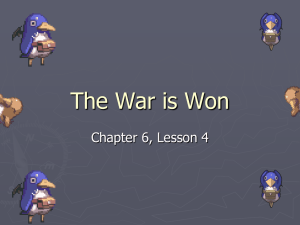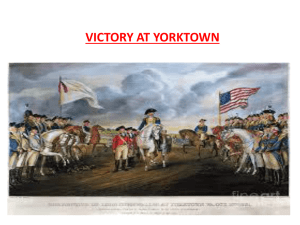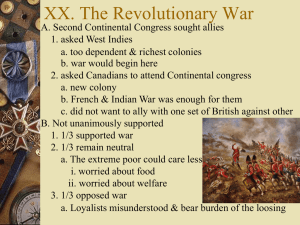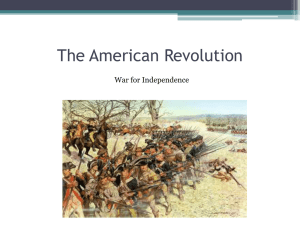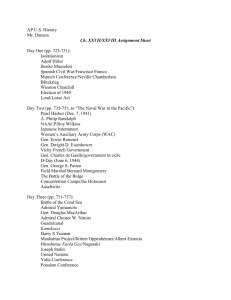Struggling Toward Saratoga
advertisement
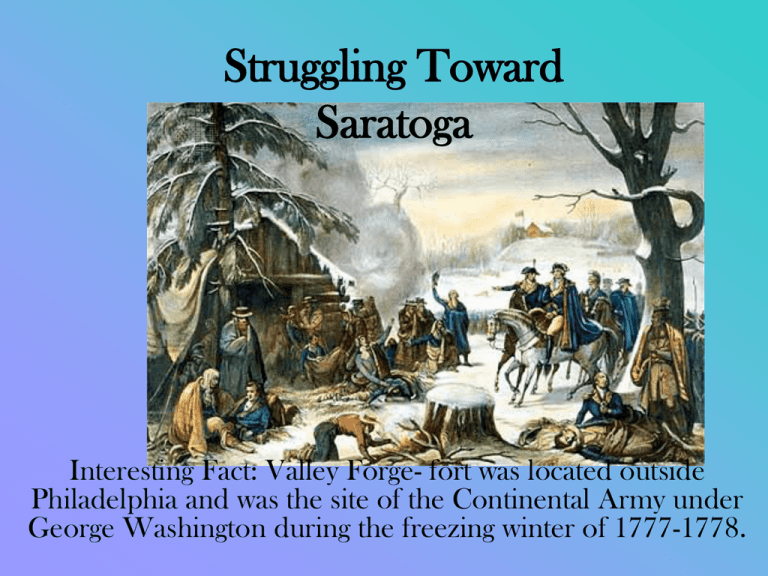
Struggling Toward Saratoga Interesting Fact: Valley Forge- fort was located outside Philadelphia and was the site of the Continental Army under George Washington during the freezing winter of 1777-1778. The War Moves to the Middle States • A. Battle of New York – British want to seize New York – Gen. William Howe & Adm. Richard Howe (largest British expeditionary force ever) – Many of the British troops came from Germany, and American troops called them Hessians (after the German area know as Hesse) – Gen. Washington was outnumbered – Battle ended in late August 1776 with American retreat – American troops pushed back to Delaware River in Pennsylvania • B. Battle of Trenton – – – – Christmas night 1776, Gen. Washington led troops across Delaware River Marched nine miles to Trenton, NJ to a garrison held by Hessians Surprise attack and the Americans win Won another battle at Princeton nine days later (moral is very high) • C. Fight for Philly – – – Gen. Howe (British) wants to seize Am. Capital (Philly) Continental Congress flees city while Gen. Washington and troops enter to defend British capture Philly • D. Victory at Saratoga – – – Gen. John Burgoyne (British) tries to march troops down to NYC to meet Gen. Howe (but Gen. Howe was busy in Philly and wasn’t coming) Gen. Horatio Gates (American) surrounded British troops at Saratoga Gen. Burgoyne surrendered on Oct. 17, 1777 (changed Britain’s war strategy, from now on, keep troops close to coast) • E. Turning Point – – – France supports the Revolution (anyone that’s an enemy of Britain is a friend to France) sign treaty of cooperation with Americans, Feb. 1778 France won’t make peace with Britain until Britain recognizes American independence • F. Winter at Valley Forge – – Gen. Washington running out of supplies, troops must spend winter at Valley Forge with little food, clothing, and supplies went in with 10,000 left with 8,000 Colonial Life During the Revolution A. Financing the War – Running out of money to finance the war – Congress borrows money by selling bonds – Printed money called Continentals causes inflation – Smuggling of arms from Europe – Profiteering (selling scare goods for profit) – Haym Salomon and Robert Morris raised funds and allowed the govt. to pay troops with gold coin in Sept. 1781 B. Civilians at War – Wives manage farms, shops, businesses, households, and families – Volunteer to mend clothing for troops, make ammunition from family silver – Many women followed the soldiers and washed, mended, and cooked – Some women even went onto the battlefield (Margaret Corbin, Mary McCauley) – about 5,000 African Americans served in Continental Army Winning the War European Allies Shift the Balance • Continental Army becomes an effective fighting force thanks to the help of Prussian Captain Fredrich von Stuben A. Lafayette and the French – At Valley Forge Gen. Washington was assisted by a young, brave French aristocrat, the Marquis de Lafayette – Lafayette was able to get French reinforcements and lead a command in Virginia British Move South A. Early British Success in the South – Gen. Charles Cornwallis (Br.) and Gen. Henry Clinton (Br.) captured Charles Town, South Carolina – Most of 1780, Cornwallis advances in the South until a group of Patriots attacked them and cut British communication lines B. British Losses in 1781 – Although Cornwallis continued to win in the South. Gen. Nathanial Greene (Am.) weakens British forces in attacks in North Carolina – Cornwallis makes his way to Virginia but failed in taking over Lafayette and von Stuben – Cornwallis then make his way to Yorktown British Surrender at Yorktown • Lafayette suggest American and French armies should join with two French fleets and attack British forces at Yorktown A.Victory at Yorktown – French fleet defeats British fleet and blocks Chesapeake Bay – French and American troops surround Yorktown and bombard them day and night – The bombardment of Yorktown lasts three weeks – Cornwallis surrendered on Oct. 17, 1781 – On Oct. 19, 1781 Gen. Washington accepts the surrender B. Seeking Peace – Paris peace talks 1782 – four nations meet (America, Britain, France, and Spain) – US sent John Adams, Ben Franklin, and John Jay – Before talks are to begin the British must recognize American independence – Sept. 1783 Treaty of Paris is signed • US got independence • Territory was from the Atlantic Ocean to the Mississippi River and from Canada to Florida War Becomes a Symbol of Liberty A. Impact on American Society – little distinction between rich and poor during war – egalitarianism (brief equality) for white men – women and African Americans still little to no rights – by 1804 some Northern States begin to outlaw slavery – Native Americans pushed out of their lands in the west with more people moving B. Challenges of Creating a Government – need to build a stable republic, a government of the people – Who participates? – How will the government answer to the people? – How will everyone have a voice?
